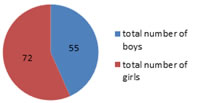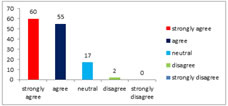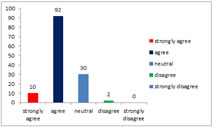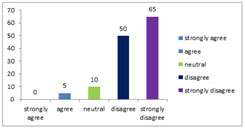|
Table of Content - Volume 19 Issue 1 - July 2021
Impact of Whatsapp in improving learning among 9th semester MBBS students
Y Satish Reddy
Assistant Professor, Department of General Surgery, Viswabharathi Medical College and General Hospital, Kurnool, INDIA. Email: satish.yeddula@gmail.com
Abstract Background: Interactive Teaching learning can be used in clinical subjects like surgery for better participation of students as one-way didactic lectures do not involve active participation of students. WhatsApp is one of the most famous messaging services which everyone use and it is easy, cheaper, and faster. Objective: the purpose of the study was to study the impact of whatsapp in improving learning in general surgery among 9th semester medical students. Methods: This study was conducted among 9th semester MBBS students in Surgery department. Students were divided into group a (study group) and group b(control group) by a simple random sampling. Gastric cancer was discussed among students of both Groups through didactic teaching. after didactic teaching, only Group A students were exposed to social media type of learning, i.e., using WhatsApp, after the session a multiple-choice questionnaire having 10 MCQs was given to both groups and an additional poll was conducted among the Study-group students to assess their perception towards Whatsapp intervention. the mean score obtained by both the groups were compared with unpaired t test. P-value <0.05 is taken as statistically significant. Results: The mean (SD) score of the Study-group was 8.58(1.18) and the mean (SD) score of the Control-group was 5.41(1.32) and statistically significant difference was found between the two groups scores with a p-value less than 0.05 opinion poll found that the intervention of whatsapp among study group was effective. Conclusion: we observed that the usage of WhatsApp in addition to the didactic teaching was found advantageous and enhanced learning in undergraduate students Key words: WhatsApp, Interactive learning, social media, Surgery.
INTRODUCTION Educational research noticed that medical students receive the information passively when they are taught with traditional lectures.1 it is observed that when students participate actively, their learning activity is increased.2 medical students are spending maximum time with smartphones and internet as they are easy available. E-learning can be transmitted by smartphones through sharing images, data and videos.3 Medical Council of India (MCI) has highlighted the use of technology in the new competency-based undergraduate medical education curriculum [74]. WhatsApp can be used to improve the interaction between students and teachers for motivation and learning.4 WhatsApp is a commonly used social media app for communication and sharing information in medical field.5 When face to face meeting is not possible, whataspp can be an important tool for developing virtual learning.6 Whatsapp which is social media app launched in the year 2009 and accelerated with over 400 million active users each month as it has a simple design to use.8 WhatsApp Messenger can be used send instant messages, photos, video, and voice messages and to make voice calls over an Internet connection.9 As it is possible to check who is online or not and to also to check if recipients have received or read messages or not, it can be used for group work.10 This study was conducted to determine the impact of using Whatsapp in enhancing medical education and also to investigate the perception of final year MBBS students on the use of whatsapp as a supplementary learning tool
METHODS This study was done at Department of General surgery, Viswabharathi Medical college and general Hospital, Kurnool for 1 month from 15/10/2020-14/11/2020. 137 students of 9th semester MBBS students were divided in to 69 students of study group (group a) and 68 students of control group (group b) by simple random sampling. Gastric cancer topic was taught with didactic teaching among both Groups. In addition, Group A students were exposed to social media method of learning, i.e., using WhatsApp, and handled by same faculty. Whatsapp group students were informed to have mobile data and WiFi in their phone connection and informed to download Whatsapp in their mobile phones and topic-related material (Pictures, Case study, videos, Rapid questions) were sent. To assess the effect of Whatsapp intervention on academic performance, a multiple choice questionnaire having 10 MCQs related to the topic covered was prepared and given to both groups immediately after the session. By using a questionnaire, the student’s opinion towards Whatsapp teaching as a supplementary method in addition to the traditional teaching was assessed using a questionnaire. At the end of session , group A students were asked to answer a validated feedback questionnaire consisting of six closed ended questions in a Likert type scale and was noted down [11]. Each closed ended question was to be rated in the scale of 1-5 (1-strongly disagree, 2- disagree, 3 - Neutral, 4- agree, 5 –strongly agree). A total of 130 students answered to the feedback questionnaire. Data analysis: data analysis was done using SPSS version 16. Un-paired t test was used to compare the mean score obtained by both the groups. P-value <0.05 is taken as statistically significant.
RESULTS A total of 134 students took part in the study. Of these 137 students, 40% (55/137) were males and 60% (72/137) were females.
Figure 1
the mean (SD) score of the Study-group was 8.58(1.18) and the mean (SD) score of the Control-group was 5.41(1.32) (Table 1) and statistically significant difference was found between the two groups scores with a p-value less than 0.05.
Table 1: Comparison of Mean values of group a and group b
Following are the Students’ perception on WhatsApp usage in learning Question 1: learning general surgery via whatsapp a positive idea
Figure 2: Learning General surgery via WhatsApp is a positive idea (n=130)
Question 2: Helped to learn anytime and anywhere
Figure 3: Helped to learn anytime and anywhere (n=130)
Question 3: Appreciation of material shared as PPT, Pdf , JPG and videos
Figure 4: Appreciation of material shared as PPT, Pdf , JPG and videos files(n=130)
Question 4: Has effectively improved in general surgery learning
Figure 5: Has effectively improved in general surgery learning (n=130)
Question 5: whatsApp learning is confusing and Time Consuming
Figure 6: whatsApp learning is confusing and Time Consuming(n=130)
Question 6: Has increased confidence level in learning the subject
Figure 7: Has increased confidence level in learning the subject (n=130)
DISCUSSION Through student–teacher interaction, learning is possible to happen outside the classroom also. The Medical Council of India also brought a revision in the curriculum from teacher‑centered learning to student‑centered learning.[12] As internet is available to all, sharing of study material and interaction with faculties is possible which makes learning an interesting and interactive13 Whatsapp help in the exam preparation, as students can refer to the shared study materials any time anywhere.14 Students effectively used the WhatsApp in their bedside surgery clinical discussion also.15 Our study was done to evaluate the impact of whatsApp in improving learning among ninth semester final MBBS students and also to investigate the perception of final year MBBS students on the use of whats App as a supplementary learning tool. Gastric carcinoma was discussed with the study group (Group A) using WhatsApp in addition to the conventional way of teaching. There was a significant improvement in the mean score of Group A compared to that of Group B. In our study 58% of students have agreed that learning General Surgery using Whats app was a positive idea and 46% of students strongly agreed that it helped to learn anytime and anywhere and 48% strongly agreed that whatApp has increased the confidence level in learning the subject. Ranjan et al.,16 in their study found that 84 % of students appreciated the learning material shared as ppt files, jpg images and pdf files as valuable resource material. In our study 71% of students appreciated the learning material shared as ppt files, jpg images and pdf files as valuable resource material and 48% strongly agreed that whatApp has increased the confidence level in learning the subject. A study by Rambe and Bere in their study found that students have given positive feedback about whats App as learning tool.[17] in a study done by Mohana krishnan et al. found that WhatsApp increases learning.18
CONCLUSION As Whatsapp has become a convenient tool for teaching learning activity due to its facility of learning anywhere and anytime and also having the constant availability of Facilitator, it is concluded that WhatsApp can be used in supplementation with traditional teaching for improving learning among medical undergraduates
REFERENCES
Policy for Articles with Open Access
|
|
 Home
Home







